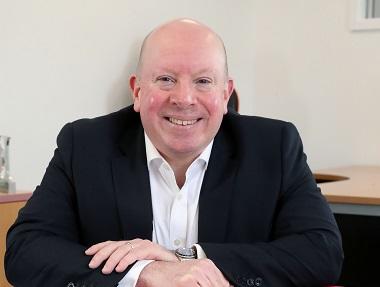Named one of the most influential disabled business leaders in the UK, Julian played a key role in helping Swansea to become the UK’s first Disability Confident city and previously volunteered as FSB’s Chair of the Disability, Health and Welfare Policy Unit.
Tell us about yourself and your business.
My background is in human resources and development. I’ve been fortunate enough to work for large organisations for much of my career and progressed to senior level.
In 2005, I collapsed from a neurological condition, which turned out to be brain damage, and that was a major change in my life. I was housebound for nearly three years. It took me five years to learn to stand, walk, and talk, and I became homeless for a period. As I was trying to get myself back into work as a disabled person, bearing in mind my career background, I started to see for the first time the barriers that disabled people face.
Having spent nine years long-term unemployed, I started Delsion, a people and development consultancy to support organisations to be more diverse and inclusive.
Why did you choose self-employment?
I realised that I wasn’t fit enough to go back into a role which was constrictive around when I had to work. One of the main motivators for me was flexibility, so I decided to start my own business where I could manage my own time and health better.
What support or advice did you find useful when starting your own business?
I’ve had support from other entrepreneurs, but I’ve found routes you would normally expect support from to be limited, as there was less understanding around disability and schemes like Access to Work. A lot of the information out there is aimed at larger businesses and I think there needs to be something specific around disabled enterprise that also fits the needs of smaller businesses.
FSB has always been with me since I started the business and Ben Cottam in Wales has been extremely supportive. It’s allowed me to feel like I belong to something. I now volunteer as Chair of the Disability, Health and Welfare Policy Unit at FSB. I’m extremely proud of my role in helping FSB to be seen as the biggest voice for small businesses, especially in this area.
What advice do you have for disabled entrepreneurs looking to start their own business?
Speak to as many people as possible. Understand what’s best for yourself and don’t be overawed by the size of the task. On a personal level, I’ve used my resilience, tenacity and problem-solving skills in my business. I would encourage anyone who wants to start their own business to do it for the right reasons.
It’s easy to be put off starting your own business because there doesn’t appear to be much support out there. By speaking to the right people, including the likes of FSB, there’s a real opportunity.
You helped to make Swansea the first Disability Confident employer city in the UK. How did you achieve this and what impact has this had?
Disability Confident is a Department of Work and Pensions (DWP) scheme that aims to help employers hire, retain and develop people with disabilities and long-term health conditions. At the time, I was still unemployed and I was invited to speak at the Cardiff event to share my experiences. I was surprised that there weren’t as many employers in the room as I thought there would be.
When I set up my business, I thought we could make a real impact with Disability Confident. Delsion has a clear social goal to make Wales one of the leading nations for inclusion, specifically around disability within the workplace. After the launch of an MP’s toolkit, which allows any MP to put on their own Disability Confident event, I went to my local event and asked I asked if I could hold one on their behalf.
The city is home to a number of large employers, such as Swansea University, Swansea Council, and the Driver and Vehicle Licensing Agency (DVLA). I realised that by getting them on board, we could get around 70 per cent of employment represented. During the event, we shared practical advice and real stories about how we can make the workplace more inclusive for disabled people. As a result, Swansea was awarded the first Disability Confident city. Around 18 months later, I was informed that Swansea had the highest proportion of disabled people in employment across Wales.
Since then, Delsion has worked with many large organisations, such as Transport for Wales, but if you start looking at the figures, the greatest successes sit within small businesses. Small businesses employ more disabled people as opposed to larger organisations, in part because they can have more flexibility.
Delsion has recently been accredited as a disability-owned business enterprise (DOBE). We are the first organisation outside of the US to receive the certification. With DOBE accreditation, we’re able to work more directly with larger businesses who are looking to increase the diversity of their supply chain. I think it’s a big opportunity for small businesses.


